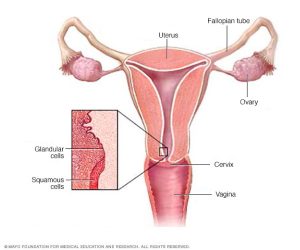What Is Cervical Cancer?
Cervical cancer happens when strange cells on the cervix outgrow control. The cervix is the lower part of the uterus that opens into the vagina. Cervical cancer can frequently be effectively treated when it’s seen as ahead of schedule. It is typically found at a beginning phase through a Pap test.
Types of cervical cancer

There are 2 main types of cervical cancers known to affect women:
1. Squamous cell carcinoma: It is a type of cervical cancer which begins in the thin, flat squamous cells, lining the outer part of the cervix. It constitutes up to 90% of the total cervical cancer cases. Best Cervical Cancer Specialist Bandra.
2. Adenocarcinoma: It is a type of cervical cancer which begins in the glandular cells that produce mucus.
3. Adenosquamous carcinoma or mixed carcinoma: It occurs when the cervical cancer shows the features of both squamous cell carcinoma and adenocarcinoma.
What Causes Cervical Cancer?
Dr. Samar Gupte is the Best Cervical Cancer Specialist Bandra. Most cervical cancer is brought about by an virus called human papillomavirus, or HPV. You can get HPV by having sexual contact with somebody who has it.There are many kinds of the HPV virus. Not a wide range of HPV cause cervical cancer. Some of them cause genital moles, however different sorts may not bring about any side effects.
You can have HPV for quite a long time and not know it. It stays in your body and can prompt cervical cancer years after you were contaminated. For this reason you should have customary Pap tests. Pap test can find changes in cervical cells before they change into malignant growth. Assuming you treat these cell transforms, you might forestall cervical cancer. Get the Best Cervical Cancer Specialist Bandra and there best treatment
What Are The Symptoms?
Beginning phases of cervical cancer give no indication and side effects. The vast majority of these signs and symptoms are noticed exclusively in the high level stages. Consult the Best Cervical Cancer Specialist Bandra. These are as follows:
1. Vaginal bleeding after sexual intercourse
2. Vaginal bleeding in between periods or post menopause
3. Prolonged menstrual cycles than usual
4. Pain while having sex
5. Persistent pain in the pelvic region
6. Abnormal discharge of fluids from the vagina
7. Pain while urinating
Visit and Consult the Best Cervical Cancer Specialist Bandra.